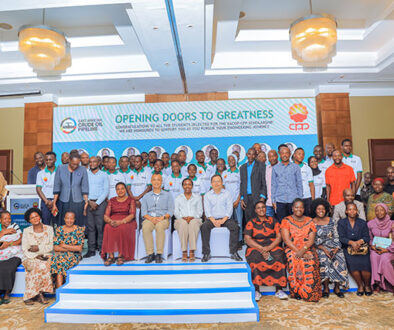Financing education’s next edge

By Our reporter
KAMPALA – Financing shortfalls, learning poverty, and the lingering scars of the COVID-19 pandemic continue to undermine the promise of quality education. At the heart of these challenges lies a pressing question: how can schools, parents, and governments fund sustainable learning in a country where 70% of the population is under 25?
Speaking at the SchoolPay 2025 Education Symposium, held under the theme “Building a Resilient Education Value Chain: Financing Models for Sustainable Growth,” held on Sept 03, at the Kampala Serena Hotel, Juliet Atuhaire Muzoora Commissioner from the Ministry of Education and Sports thanked Fincom and SchoolPay for their innovation.
“SchoolPay is not just providing a financing solution; it is also showing our young people the way forward. In our competence-based curriculum, children are even emulating what SchoolPay does in their projects on financing solutions. With 70% of our population being youth, how we handle them is the key to our nation's future, and SchoolPay is a powerful tool for that.”
“As a ministry, we face a major challenge with accountability. SchoolPay helps by pooling all the collections of our institutions into one place. This system allows school leaders, boards of governors, and directors to control both what comes in and what goes out, providing a level of transparency we truly appreciate. This is why we are happy to have SchoolPay as part of the enhancement of quality education,” she added.
She also applauded SchoolPay for its pocket money handling solution.
“Before this innovation, managing pocket money was a nightmare for parents. Now, our children have wristbands to manage their funds. I appeal to you, the stakeholders, to go a step further and provide financial education to these learners so they learn not just to spend but also to save”.
The event convened policymakers, bankers, telecom providers, and development partners to discuss one of the country’s most urgent challenges and to showcase how SchoolPay, once known simply as a digital school fees gateway, is rapidly evolving into the financial and data backbone of Uganda’s education ecosystem.
“When the public thinks of us, they still imagine a simple school fees payment platform,” admitted Joseph Ndiho Kiiza, Board Chair of Fincom technologies.
“But from day one, we had far bigger dreams. Our ambition is to create a value chain platform that connects every stakeholder parents, schools, banks, telecoms, suppliers, and even government.”
Today, SchoolPay aggregates millions of transactions across thousands of schools, providing a single source of truth for school finances. Beyond collecting fees, it pools income into centralized accounts, streamlines reporting, and allows school boards to monitor inflows and outflows with transparency. For parents, it eliminates the risks of carrying cash and increasingly links them to credit lifelines in the form of school fee loans. For government, it offers something even more powerful: real-time data on the health of the education sector, potentially transforming how resources like capitation grants are monitored and disbursed.
The urgency of innovation in education finance cannot be overstated. The government allocations of up to 20% of the national budget to the education sector. Globally, the World Bank estimates that 70% of children in lower- and middle-income countries complete primary school without the ability to read a simple passage. In Africa, the challenge is acute: millions remain out of school altogether, while those enrolled often face crumbling infrastructure, poorly resourced teachers, and limited access to quality learning.
The market opportunity, however, is significant. Education finance products globally represent a $36.4 billion market, with Africa accounting for $5.4 billion. In Uganda, where traditional banking products rarely cater to schools or low-income parents, SchoolPay’s partnerships with financial institutions are beginning to unlock this potential.
Tineyi Mawocha chief programme officer and Africa regional director of opportunity international explained that school improvement loans and school fee loans are already changing the game.
“Schools that access financing can expand classrooms, hire better teachers, and invest in water and sanitation facilities. Parents who access fee loans are keeping their children in school instead of pulling them out. That is direct social impact with measurable returns”.
“At Opportunity International, we have cumulatively worked with 208 financial institution partners in 32 countries,” Mawocha said.
“We use Opportunity Bank here in Uganda and in Ghana as ‘sandboxes’ to experiment with products. So far, 19 million children have benefited, with over $1 billion invested into the education sector, mainly through affordable non-state or private schools,” he added Data from Uganda shows that 85%of parents who accessed fee loans through SchoolPay partnerships were able to keep their children enrolled.
Joseph Ndiho Kiiza described the platform’s vision: “We’re not just tracking fees. We’re linking financial flows with operational data like student and teacher attendance, lesson coverage, and school infrastructure gaps. This creates a performance profile of every school, which is invaluable for banks, regulators, and policymakers.”
“For financial institutions, this reduces risk. For government, it provides evidence for policy. For schools, it delivers transparency. And for parents, it ensures accountability”.
Mawocha also spotlighted Furaha, a digital lending platform co-created by Standard Chartered Ventures, SchoolPay, telecoms, and financial institutions. Its mission is to give parents access to school fee loans via mobile wallets.
“We partnered with Standard Chartered Ventures on a platform called Furaha, which provides a lending facility to parents to access school fees. So far, 25 million telco wallets can access Furaha, and we know that six million children in Uganda can have their fees paid through a Furaha loan,” Mawocha highlighted.
“To build a resilient education value chain, we must mobilize blended finance, engaging DFIs, commercial banks, and philanthropic capital. We must also scale proven models like the school improvement and school fee loans through partnerships with financial institutions”.
For SchoolPay to reach its full potential, integration with government policy will be key.
Commissioner Atuhaire’s call for the platform to help monitor capitation grants is a significant opening.
“SchoolPay has helped parents pay fees, but how can we use this technology to monitor the capitation grants and other government grants given to our institutions? As a ministry, we are ready to partner with you on policy to ensure this innovation doesn’t just end with fees but improves the overall management and delivery of education,” the commissioner added.
Charity Mutagamba, CEO of Fincom, confirmed the company’s readiness.
“We are not against working with government. In fact, we see policy partnership as the next frontier ensuring transparency in public funds while supporting financial sustainability for schools,” she said.


